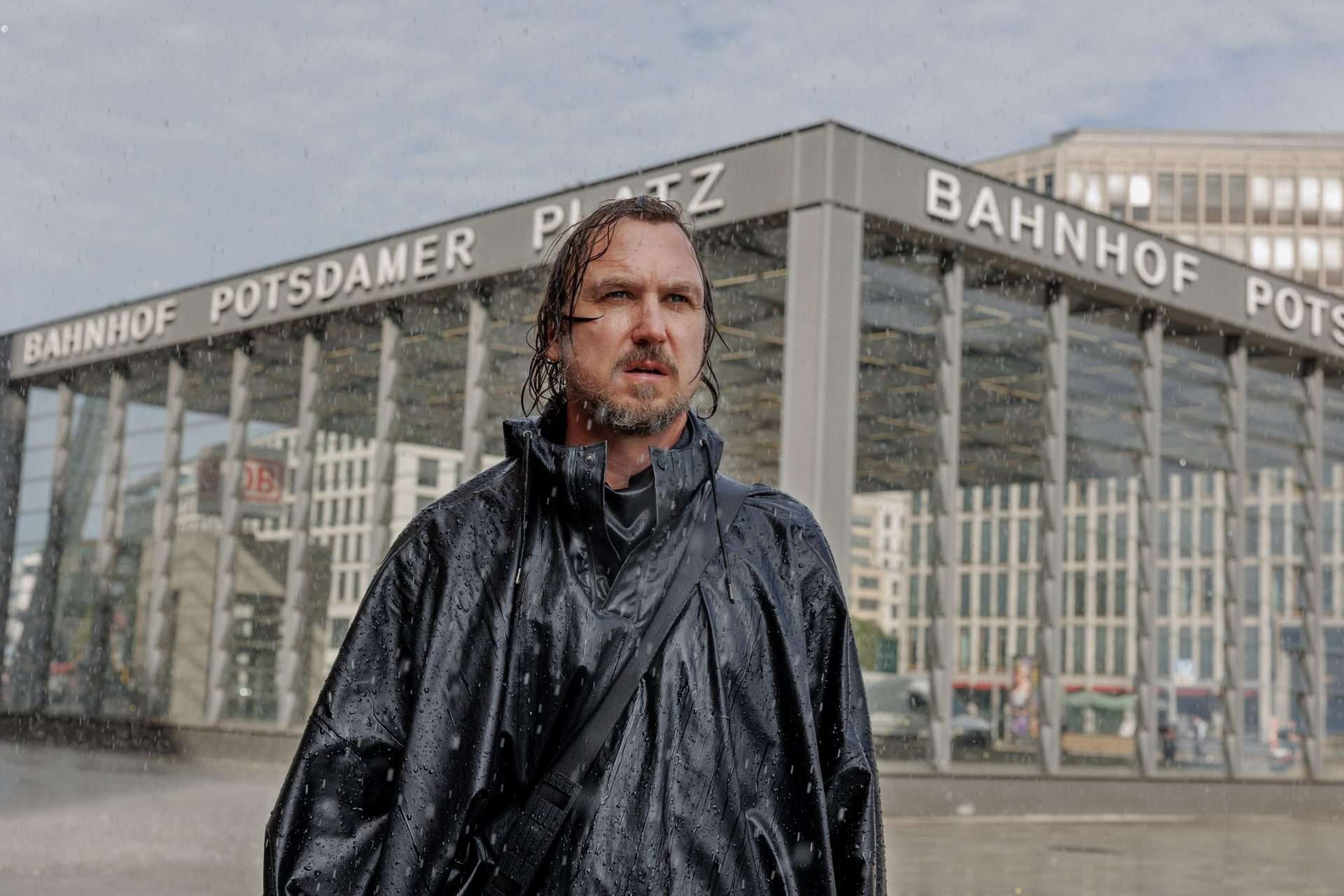Tom Tykwer’s “Das Licht” (The Light) opened Berlinale 2025 with the kind of divisiveness rarely seen in festival history. Echoes of boos resonated through the press screening, but one could almost sense an undercurrent of guilty applause. Perhaps this was fitting for a film so deeply entangled in the complexities of performative guilt, social justice satire, and white savior tropes. But “Das Licht” is no straightforward commentary. It’s an extravagant, muddled spectacle that walks a fine line between satire and sincerity, never quite deciding which path to follow.
Right from the opening sequence, the camera flying over Berlin, gives a scent of “Wings Of Desire.” But Tykwer’s ambition is different: a propulsive, ever-present score propels us through a rain-soaked Berlin, where the downpour is less a noirish atmosphere and more a visual metaphor for perpetual societal discontent. It is an unmistakably stylish film, brimming with visual flair and the kinetic editing rhythms Tykwer mastered in “Run Lola Run.”
Tykwer decides to dress the film in such self-sufficient stylishness that it tries to catch up with itself till the end. While adhering to a script that tries hard to self-reflect but is limited to a horizon that offers nothing new creates a cognitive dissonance, echoing the contradictions of Western liberalism itself. The filmmakers pride themselves on intellectual sophistication, yet so often resort to the same predictable narratives and stereotypes when confronting societal issues. Is the film’s tonal inconsistency a flaw, or a reflection of the ideological chaos it seeks to critique? In that regard, it is the perfect opening film to reflect the current existential environment in Germany – a reflection of the reflection of these times.
The characters of “Das Licht” are less people and more archetypes: a cynical PR executive, an overworked career mother with fractured family ties, a genderfluid climate activist lost in party culture, and a game-addicted son detached from reality. These characters are so deeply steeped in their stereotypes that they represent a typical upper-class German family’s existential threshold. It reflected well on the upper class of Prenzlauer Berg for whom the morality is limited to recycling and voting for the Green Party.
This might feel like lazy writing, but it could also be interpreted as a deliberate choice. By rendering them as hollow avatars, Tykwer mirrors the way society often dehumanizes individuals by reducing them to political symbols. We see them not as people but as manifestations of ideologies: capitalism, feminism, activism, digital escapism. We empathize not with their humanity but with their social context. In this way, “Das Licht” exposes the inherent superficiality of identity politics when detached from genuine human complexity.

Then comes the most contentious figure in the film: the enigmatic Syrian refugee woman who arrives with a big heart and an even bigger secret to “fix” the broken German family. She is the quintessential Western liberal fantasy—a dream of moral redemption packaged in the body of an immigrant. She is meant to represent both the guilt and the hope. A vehicle for catharsis that is designed to make them feel better about themselves.
Tykwer tries to present her as a complex character, but she ultimately functions as a narrative device to ease the family’s depression. Her refugee identity becomes a mere accessory to the film’s thematic agenda, reducing her to a one-dimensional symbol rather than a person with agency. This approach inadvertently reinforces the very stereotypes the film seems to critique, positioning her as a savior whose value is defined by her capacity to heal Western disillusionment.
Also Read: The Good Sister (Schwesterherz, 2025) ‘Berlinale’ Movie Review: Marie Bloching’s Gut-Wrenching Performance Anchors This Drama about a Sister in a Moral Conundrum
The narrative manipulation here is problematic, not just because it simplifies the immigrant experience but because it exploits it for emotional impact. The film positions her as the answer to Western alienation, implying that the Global South exists to serve the spiritual needs of the Global North. In this light, “Das Licht” risks slipping into the white savior narrative it ostensibly seeks to deconstruct.
The thematic heart of “Das Licht” lies in its exploration of performative guilt. Tykwer doesn’t merely portray white guilt; he satirizes its performative nature. The characters are constantly engaged in performative acts of self-accusation, over-reflecting on their privileges without ever truly confronting them. It’s an astute observation of the liberal elite’s obsession with guilt as a form of social currency. An act of self-flagellation that ultimately leads to self-congratulation.
This is where “Das Licht” is at its most incisive. It captures the cycle of guilt and absolution, showing how Western privilege is maintained even through its critique. The film’s characters reflect on their social advantages with such performative intensity that it feels more like narcissism than empathy. They are trapped in an echo chamber of moral vanity, applauding themselves for their enlightened self-awareness while doing nothing to dismantle the structures that sustain their privilege.

Yet, by the end of the film, one can’t help but feel that Tykwer himself is trapped in this cycle. In his attempt to satirize performative guilt, he inadvertently indulges in it. The film’s grandiosity and visual flair feel like acts of self-congratulation as if Tykwer is celebrating his own cleverness in diagnosing Western liberalism’s hypocrisy. The result is a film that criticizes the very thing it embodies, creating an ouroboros of ideological conflict.
“Das Licht” is a film as conflicted as the society it depicts. It is a satire that can’t help but indulge in sentimentality, a critique of privilege that luxuriates in its own aestheticism. It wants to deconstruct the white savior narrative while relying on it to drive its plot. Moreover, it seeks to expose performative guilt yet ultimately becomes an exercise in it.
But perhaps this is what makes the film so compelling, even if infuriating. It reflects the contradictions of our time—our yearning for redemption and our inability to achieve it without reinforcing the very hierarchies we seek to dismantle. It is a messy, audacious film that is as imperfect as the moral landscapes it navigates.
In the end, the Berlinale opener may not succeed as a satire, but it does succeed as a reflection of the Western psyche. It holds up a cracked mirror, revealing the fractured self-awareness of a society caught between guilt and gratification, critique and complicity. It is a film you can’t fully embrace, yet one you can’t easily dismiss.
And perhaps that is its most haunting success.


![Bright: Samurai Soul [2021] Review – A Servicable Story About Orcs, Elves, And Humans Elevated By Gorgeous Animation](https://79468c92.delivery.rocketcdn.me/wp-content/uploads/2021/10/Bright-Samurai-Soul-Netflix-Review-1-768x384.jpg)
![A Family Tour [2018]- ‘NYFF’ Review](https://79468c92.delivery.rocketcdn.me/wp-content/uploads/2018/10/a-family-tour-hof-768x432.jpg)

![The Sadness [2021]: ‘Locarno’ Review – An Interesting Gore Fest that Never Takes Off](https://79468c92.delivery.rocketcdn.me/wp-content/uploads/2021/08/the-sadness-2021-locarno-768x512.jpeg)

![How to Kill a Cloud [2021]: ‘Locarno’ Review – The Quandaries of a Rainmaker](https://79468c92.delivery.rocketcdn.me/wp-content/uploads/2021/08/How-to-Kill-a-Cloud-2021-768x512.jpg)